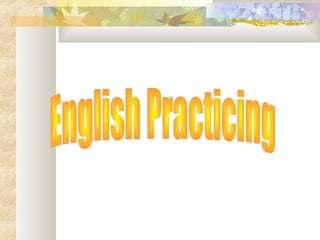
Here is a sample conversation using the present simple tense about daily habits and routines:Student 1: What time do you usually wake up?Student 2: I usually wake up at 7am on weekdays. How about you?Student 1: I wake up at 6:30am so I have time to get ready for school. What do you do after you wake up? Student 2: After I wake up, I get dressed and have breakfast. Then I brush my teeth and pack my bag for school. What do you do in the mornings?Student 1: In the mornings I get dressed, eat a quick breakfast like cereal or toast, and then brush my teeth. I usually leave for school around
- 3. The Present Simple :By Veronica De Jesus Luna Espinoza
- 4. The Usages of the Present Simple USE 1: Repeated Actions USE 2: Facts or Generalizations
- 5. Use 1 USE 1: Repeated Actions Use the Present Simple to express the idea that an action is repeated or usual. The action can be a habit, a hobby, a daily event, a scheduled event or something that often happens. It can also be something a person often forgets .or usually does not do
- 6. Examples Subject + (Verb) + (s, es) + Object - I play tennis. - She does not play tennis. - The train leaves every morning at 8 am. - The train does not leave at 9am.
- 7. USE 2: Facts or Generalizations The Present Simple can also indicate the speaker believes that a fact was true before, is true now, and will be true in the future. It is not important if the speaker is correct about the fact. It is also used to .make generalizations about people or things
- 8. Examples Subject + (Verb) + (s, es) + Object Cats likemilk.- . .- Birds do not like milk Windows aremade of glass.- .- Windowsare not made of wood
- 9. Grammatical View Present Simple, third person singular :Note he, she, it :A ,in the third person singular the verb : always ends in s he want s she need s
- 10. .BAdd es :to verbs ending in x sh ss he fix es it push es he pass es ch o she catch es He go es
- 11. :C Verbs ending in y the third person changes the; y to ies fly flies cry cr ies :Exception y :If there is a vowel before the play plays pray prays
- 12. Negative and question forms use DOES (=the third person of the auxiliary'DO') + the infinitive of the verb. He wants. Does he want? He does not want.
- 13. :Examples . 1.Third person singular with s or es a. He goes to school every morning. b. She understands English. c. It mixes the sand and the water. d. He tries very hard. e. She enjoys playing the piano.
- 14. :Present Simple, form. 2 Example: to think, present simple Affirmative Interrogative Negative I think Do I think? I do not think. You Think Do you think? You don't think. thinks he, she, it Does he, she, it think? He, she, it doesn't think. We think Do we think? We don't think. You think Do you think? You don't think.
- 15. :The present simple is used A.to express habits, general truths, repeated actions :or unchanging situations, emotions and wishes I smoke (habit); I work in London (unchanging situation); London is a large city (general truth). . He drinks tea at breakfast- .She only eats fish- They watch television regularly-
- 16. :B. to give instructions or directions You walk for two hundred meters, then you turn left. -You take the No.6 bus to Watney and then the No.10 to Bedford. .Open the packet and pour the contents into hot water-
- 17. :c. to express fixed arrangements, present or future -Your exam starts at 09:00. .The bell rings at 8:00- The bus arrives at 7:00
- 18. D.to express future time, after some conjunctions: after, :when, before, as soon as, until He'll give it to you when you come next Saturday- .His mother arrives tomorrow- -Our holiday starts on the 26th March. .She'll see you before she leaves-
- 19. Time expressions There are time expressions that we use only with the :Present Simple and they are Every day, every Friday, every week, every month, every summer,.1 .every month, every year, always, usually, etc All the time.2 . .I go to school every day .He visits me, every summer
- 20. Activities 1. Ask your friends questions about what they do at different times. Also ask about their families, what sport,food do they like. - "What time do you get up?" - "When do your brothers go to bed?“ ¨what is your favorite fruit?¨ teacher will write down the answers on the board and help with pronunciation.
- 21. (Write the questions for the following answers. (Present Simple ? . .1__________________________________ .I work in a bank .2_____________________________________? .My brother is an engineer ?___________________________________.3 .He lives in an apartment building
- 22. Put in : do/don't/does/doesn't. ?Excuse me, _____________ you speak English.1 Where's Ann? I _____________ know.2.. George is a good tennis player but he ___________ play very often.3
- 23. What sports do you do
- 24. Eat Healthy
- 28. time to write a conversation with a partner The teacher will give instrucctions so students will write a conversation using the simple present and talk about his / her habits and routines
- 29. The instructor will show you a - pictures, and write about your habits or routines help yourself with the pictures. - Use the simple presente,adverbs of frequency,and propostions of .time
